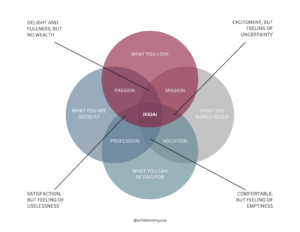15 Jan Finding Happiness and Longevity Through Your Ikigai
 Okinawa, Japan, is a small village known for its remarkable number of people over the age of 100. Okinawans have a specific approach to life that may be the reason for their longevity. That approach is called Ikigai. This term, pronounced ee-key-guy, has no direct translation in English. It refers to the reason one wakes up in the morning or the purpose that drives one’s life. In recent years, Ikigai has gained international attention, offering a window into the lifestyle of those who not only live longer but also lead more fulfilling lives.
Okinawa, Japan, is a small village known for its remarkable number of people over the age of 100. Okinawans have a specific approach to life that may be the reason for their longevity. That approach is called Ikigai. This term, pronounced ee-key-guy, has no direct translation in English. It refers to the reason one wakes up in the morning or the purpose that drives one’s life. In recent years, Ikigai has gained international attention, offering a window into the lifestyle of those who not only live longer but also lead more fulfilling lives.
The Origin and Meaning of Ikigai
Ikigai (生き甲斐) combines two Japanese words: “iki” (to live) and “gai” (reason). It originated from the Heian period (794 to 1185) and has evolved over centuries. Unlike Western concepts of happiness or success, Ikigai is deeply personal and varies from person to person. It’s finding the sweet spot in the middle of what you love, what you are good at, what the world needs, and what you can be paid for.
Impact on Health and Longevity
The Okinawans, with their strong sense of Ikigai, often lead active, purposeful lives well into their 100s. Consequently, the concept encourages a balanced lifestyle with a healthy diet, regular physical activity, strong social connections, and a positive mindset. This holistic approach is believed to contribute significantly to their remarkable longevity.
 Finding Your Ikigai
Finding Your Ikigai
Discovering your Ikigai is a journey of self-exploration and reflection. It’s about understanding yourself deeply and aligning your life with what brings you meaning and joy. Here are steps to guide you in finding your Ikigai:
-
- Self-Reflection: Start with introspection. Reflect on what activities make you feel most alive, when you lose track of time, or what you loved doing as a child.
- Identify Your Passions: List what you love – these are activities that bring you joy and satisfaction.
- Recognize Your Talents: Acknowledge what you are good at. These can be skills you’ve naturally excelled in or areas where you have substantial experience.
- Understand What the World Needs: Think about the needs of the world that resonate with you. This could be anything from environmental issues to helping others.
- Consider Economic Viability: Explore how you can combine your passions, talents, and what the world needs in a way that you can earn a living from it.
- Experiment and Explore: Try new things related to your interests and skills. Volunteering, part-time jobs, or hobbies can be great ways to explore.
- Seek Feedback: Talk to others about your ideas. Sometimes, external perspectives can offer insights into your unique strengths and opportunities.
- Envision Your Life: Based on your reflections, envision a life that would be fulfilling and meaningful for you.
- Set Goals and Take Action: Identify small, achievable steps to move toward your Ikigai. Remember, finding Ikigai is a continuous journey, not a destination.
Diverse Perspectives
Finding your Ikigai may seem like a lofty or even impossible endeavor. However, it’s important to understand that the commonly discussed version of Ikigai is often viewed through a Westernized lens. In contrast, Okinawans traditionally align Ikigai with finding joy in the small things, living in the moment, and building a happy life. This perspective is less about professional achievement and more akin to a Zen Buddhist mentality. It emphasizes being active, present in the moment, and finding a state of flow in everyday experiences. While the popular Ikigai diagram is useful, the more traditional understanding centers on the simple joys of life and finding your ‘sweet spot’.
Conclusion
In conclusion, we live in a world where stress and burnout are common. However, the concept of Ikigai offers an alternative path. It is about finding joy and purpose in everyday activities, leading to a fulfilling and long life. As the West embraces mindfulness and well-being, Ikigai provides a practical and profound philosophy to live by. We hope you find yours!
